|
|
Posted 1/3/2008 (link)
 Last November, we announced that poet and artist Will Alexander was battling cancer without health insurance, and posted a recording of a benefit reading at the Bowery Poetry Club, featuring Anne Waldman, Bob Perelman, Rodrigo Toscano and Jerome Rothenberg, among others.
This new benefit reading — organized by David Buuck, and recorded December 1, 2007 at the California College of the Arts in San Francisco — includes performances by Taylor Brady, Tisa Bryant, Andrew Joron, Nate Mackey, Adam Cornford, D.S. Marriott and Juliana Spahr. On PennSound's event page for the Will Alexander Benefits, you'll also find more information about Will's condition, as well as information on how you can donate to his health care fund. Click on the title above to start listening.
Posted 1/4/2008 (link)
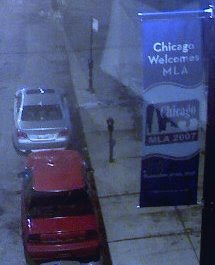 Organized by Robert Archambeau and Patrick Durgin, this year's MLA Offsite Reading was held at the School of the Art Institute of Chicago on December 28th. The marathon event features fifty poets in just over two hours, including (among many others), Dodie Bellamy, Pierre Joris, Kevin Killian, Cate Marvin, Aldon Nielsen, Bob Perelman, Kristin Prevallet, Jen Scappetone, Ed Skoog and Barrett Watten. Despite the brief time span (only two or three minutes) allotted to each poet, the readers manage to deliver wide-ranging and very often arresting performances. Rather than segment the reading into individual files, we've opted to present the event as one uninterrupted recording, so click on the title above to let the rapid-cycling experience begin.
(Special thanks to Aldon Nielsen for both the recording and the photo at left)
Posted 1/4/2008 (link)
 Recorded at Italy's Universita d'Annuzio on April 22 and 23, 1997, these recordings feature poets Kathleen Fraser and Robin Blaser commenting on the work of Dante Alighieri. While PennSound strives to document the latest groundbreaking work within contemporary poetics (such as the MLA Offsite Reading we highlighted on Friday, just one week after the actual event), we do not do so at the expense of poetry's broad history. Resources such as our PennSound Classics page and the "Nine Contemporary Poets Read Themselves Through Modernism" event (featuring Rae Armantrout, Ron Silliman and Erica Hunt, among others) recontextualize the work of poets who predate the era of recorded sound, making their words vital and immediate to modern listeners. You'll find links to both poet's discussions by clicking on the title above.
Posted 1/8/2008 (link)
 The latest installment of the PoemTalk podcast series — co-produced by the Poetry Foundation and the Kelly Writers House — has been posted. This show, featuring panelists Randall Crouch, Jessica Lowenthal, Linh Dinh and host Al Filreis, discusses a recording of Adrienne Rich's poem "Wait" from the poet's visit to Penn in 2005 as part of the Kelly Writers House Fellows program. Clicking on the title above will take you directly to the PoemTalk blog, where you can listen in. New podcasts will be added approximately every three weeks, and future shows will cover works by George Oppen, Ted Berrigan and Allen Ginsberg's rendition of William Blake, among others.
You'll also want to check out PennSound's Adrienne Rich author page, where you'll find the complete program from her 2005 visit, including a reading and conversation, as well as a recordings from SUNY Buffalo in 2000 and Cornell in 1985, plus another unidentified reading from 1974.
Posted 1/8/2008 (link)
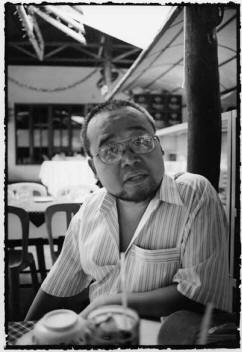 On December 12, 2007, Philadelphia poet Linh Dinh visited Studio 111 to record a new batch of poems before taping an episode of PoemTalk later that afternoon. The session that resulted contains almost fifty pieces from Dinh's collections, Blood and Soap (Seven Stories Press, 2004), American Tatts (Chax Press, 2005) and Borderless Bodies (Factory School, 2006), as well as a number of recent poems from Detainees, the poet's blog.
Dinh makes excellent use of the relaxed format, giving lengthy introductions and explanations of his poems, and ruminating on the uses of language — its proliferation and perversion — as well as his own experiences as both insider and outsider in Vietnam, the United States, Singapore, Italy and Iceland. Aside from a few bilingual poems, which alternate between English and Vietnamese, there is also a long suite of works presented as separate files in both languages. Keeping with the cosmopolitan spirit of the session, you'll find a link to a site containing a number of Dinh's poems in Vietnamese, as well as links to some of the pieces appearing on his blog.
Dinh's PennSound author page features several of his recent video works, along with readings at Penn from 1998 and 2007, plus his appearance on the first episode of Live at the Writers House. Click on the title above to start exploring.
Posted 1/9/2008 (link)
 The latest PennSound Podcast has just been added. Originating in Al Filreis' English 88 course at the end of the Fall 2004 semester, this program features poets Jena Osman and Kenny Goldsmith in conversation about the influence of John Cage's aesthetics on their own work. It's also worth noting that the discussion was recorded on December 9, 2004, the day after Jackson Mac Low's death, an event which weighed heavily on the poets' minds as they chatted.
This podcast is a distillation of the high points of their discourse — to listen to the entire recording, you can visit this page which also contains annotations and links to additional texts and recordings from these poets. Clicking on the title above takes you to the PennSound Podcast series page where you can listen to this program, along with shows investigating the work of Jerome Rothenberg, Donald Hall and the Flarf poets, as well as issues of poetics and pedagogy.
Posted 1/11/2008 (link)
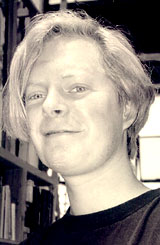 We're proud to announce the addition of The Line Reading Series to PennSound. Curated and hosted by poet Lytle Shaw at The Drawing Center in New York City, this innovative series (which ran from 2000-2006) investigated the interstices between poetry and the visual arts, asking its readers to interact and comment upon the works featured in the galleries. Though the readings are conceived as a response to specific exhibits at The Drawing Center, Shaw's thoughtful introductions provide ample context for the readings to follow.
We're launching the new series with three readings, which will give some sense of the tremendous talent Shaw was able to muster. The first Line Reading Series event, from April 18, 2000, features Brian Kim Stefans, Kenward Elmslie, and Bernadette Mayer (Lee Ann Brown makes a brief guest appearance during Mayer's set). The other two readings, from 2002 and 2003, feature performances by Kristin Prevallet, Jena Osman, Darren Wershler-Henry and Ron Padgett among others, and in the near future, we'll be adding more recordings, including performances by Tom Raworth, Tom Devaney and Kenneth Goldsmith.
In addition to the Line Reading Series page, we've also added a new PennSound author page for Lytle Shaw, where you can find a Segue Series Reading at the Bowery Poetry Club from 2004, as well as a 2006 appearance on Cross-Cultural Poetics, where he discusses his book, Frank O'Hara: the Poetics of Coterie (University of Iowa Press, 2006).
Posted 1/11/2008 (link)
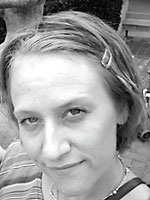 We've just added a PennSound author page for Kristin Prevallet, which features several recent additions, along with a number of older readings.
On Friday, we announced the launch of The Line Reading Series, which includes a September, 2002 reading by Prevallet, and we also have her segment from the Narrow House Recordings album, Women in the Avant Garde, along with her performance from last month's MLA Offsite Reading: "The Day Lady Died (for Benazir Bhutto)," a powerful reimagining of Frank O'Hara's Billie Holliday memorial, which pays tribute to the fallen Pakistani leader.
Additionally, we have three Segue Series recordings — a January, 2000 reading at Double Happiness, and readings at the the Bowery Poetry Club from 2003 and 2006. There are also links to an event honoring Barbara Guest, which Prevallet hosted, and her notes on Helen Adam's San Francisco's Burning, taken from A Helen Adam Reader (National Poetry Foundation, 2007), which Prevallet edited. Clicking on the title above takes you directly there.
Posted 1/16/2008 (link)
 The new year's first new episode of Close Listening features filmmaker Henry Hills in conversation with Charles Bernstein, discussing the confluences of sound and imagery in his work, the evolution of his visual aesthetic, and the merits and compromises of working in 16mm versus digital video formats. The two old friends also reminisce about New York's downtown cultural scene of the late-70s and early-80s — the overlapping groups of poets, musicians, dancers and artists (including Jackson Mac Low, Hannah Weiner, Sally Silvers, John Zorn and Fred Frith) so ably documented in Hills' films.
On Hills' PennSound page you'll find the three films recently highlighted on PennSound Daily — Radio Adios (1982), Money (1985) and A New Life (1989) — along with 1981's Kino Da! (featuring poet Jack Hirschman) and Gotham (a 1990 video clip for John Zorn's Naked City). His latest film, Failed States, will premiere at the Rotterdam Film Festival later this month, and PennSound will be adding several new works by Hills in the coming months.
Posted 1/17/2008 (link)
 This newly-segmented Segue Series reading by Rae Armantrout was recorded at the Ear Inn in New York City, on October 22, 1988. Rather than read from her most recent volume, Precedence (Burning Deck, 1985), she instead opts to share a generous selection of poems from her current manuscript, Necromance — which, she believes, will be published by Sun and Moon the following year (it would actually appear in 1991, three years later). Surrounded by friends, Armantrout delivers a relaxed and intimate performance, joking about her reputation for giving brief readings, and begrudgingly, "at Charles Bernstein's request," rereading the her first poem, when it's believed that the tape machine wasn't recording.
While Armantrout's recorded output from the past decade is well-documented on PennSound — there are seven readings altogether, plus a Close Listening interview — this reading is her earliest on the site, and the only one from prior to 1998. Now available as singles, this wonderful document is even more useful. Click on the title above to listen.
In other Armantrout news, her poem "Bonding" (from her forthcoming collection Versed), is Poetry Daily's featured poem of the day today. You can hear her read the poem as part of her visit to the Kelly Writers House last September, when you visit her PennSound author page.
Posted 1/18/2008 (link)
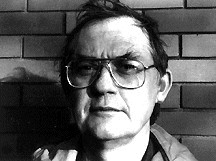 This early recording at the Ear Inn comes from a reading Steve McCaffery did with Dick Higgins on February 7, 1979. McCaffery begins with "Four Statements for Charles Bernstein," in which he observes, "The Poet pulls a gun out of his pocket and shoots a member of the audience. The audience applauds," provoking a few nervous chuckles from the crowd. A series of "Engineering Koans" — which follow in the tradition of his Yorkshire "translation" of Marx and Engels, "The Kommunist Manifesto or Wot We Wukkers Want" — weds the syntax of Eastern philosophy with automotive and plumbing lingo. He's also joined onstage by Paul Dutton and Rafael Barreto-Rivera, fellow members of The Four Horsemen, to perform "Mushy Pea: Six London Texts."
On McCaffery's PennSound author page, you'll find a wide array of readings, interviews and other performances, some augmented with text versions of the pieces. There's also a separate page for The Four Horsemen, as well as pages for individual members Paul Dutton and bp Nichol.
Posted 1/21/2008 (link)
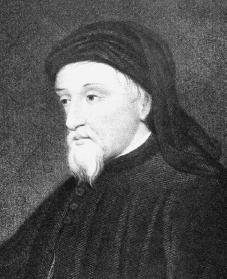 Some six-hundred years after his death, Geoffrey Chaucer is alive and well on PennSound. On our Classics Page, you'll find his work interpreted in two radically divergent ways.
Noted medievalist David Wallace, Judith Rodin Professor of English at the University of Pennsylvania, reads a number of selections from The Canterbury Tales — including excerpts from "The Wyf of Bath's Prologue," "The Pardoner's Tale" and "The Knight's Tale" — along with a few other shorter works, all in the original Middle English. In his Close Listening conversation, also included on the page, he discusses the importance of experiencing Chaucer's work in its original form, and offers up some hints to make navigating the tricky dialect a little easier. You can hear all of this on Wallace's PennSound author page.
Contemporary plurilingual poet Caroline Bergvall also makes use of Chaucer's Middle English, mixing it with languages which influenced its development, such as Latin and French, along with modern parlance to yield a postmodern, polyglot remix of The Canterbury Tales. Much as Chaucer borrowed from and reshaped diverse sources — such as Greek myth, continental folk tales, Boethius and Boccaccio — to comment upon his times, Bergvall's tales borrow Chaucer's setting, as well as his language, to comment upon current events, such as "Banned in Poland: The Summer Tale," which depicts Pope Benedict XVI's visit to Poland and its effects on day-to-day living. You can hear her updated tales, along with a number of other readings, on her PennSound author page.
Posted 1/22/2008 (link)
 Last week, we posted a few vintage Segue Series readings from the Ear Inn which had recently been broken into individual poems. This week, we'll start posting new recordings from the Segue Series' current home, the Bowery Poetry Club, starting with this October 20, 2007 reading featuring K. Lorraine Graham and Tao Lin.
K. Lorraine Graham is the author of three chapbooks: Terminal Humming (Slack Buddha), See it Everywhere (Big Game Books), and Large Waves to Large Obstacles (forthcoming from Take Home Project), along with a Narrow House chapdisk, Moving Walkways.
While he is perhaps best known for his fiction, including Bed and EEEEE EEE EEEE (both published last year by Melville House), Tao Lin is also the author of two volumes of poetry: You Are a Little Bit Happier Than I Am and the forthcoming Cognitive-Behavioral Therapy. A poetry editor for 3:AM Magazine, he describes the writing of his debut collection as an attempt to "console [him]self against unrequited feelings, loneliness, meaninglessness, death, limited-time, and the arbitrary nature of existence," before qualifying that comment with a self-consciously clever "maybe." Click on the title above to start listening.
Posted 1/23/2008 (link)
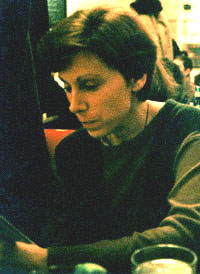 This May 26, 2007 reading at the Bowery Poetry Club closed out the Segue Series' spring season in marvelous fashion, with performances by Elaine Equi and Rae Armantrout. Armantrout, of course, is very well-represented on PennSound, and a good friend of the Segue Series, as evidenced by last week's posting of a newly-segmented reading she did at the Ear Inn twenty years ago. Her performance here, — of material from 2007's Next Life, along with forthcoming manuscripts Versed and Dark Matter — never fails to awe and delight listeners.
Elaine Equi has one other Segue Series reading, from March, 2005, available on PennSound, so here appearance here is slightly more rare. Introducing her friend and mentor last May, erica kaufman observed, "Like Roy Orbison is often referred to as having 'defied the rules of musical composition,' Elaine Equi is a poet who time and time again defies how one normally thinks of poetry or poetics. An Elaine Equi poem can easily be seen as a film still, a pop song, a drum solo, a new snazzy striped shirt." In this"poetics of transformativity, wit, speculation, and curiosity," she notes, "nothing remains stagnant." We're very glad to be able to present Equi's work here. Click on the title above to begin listening.
Posted 1/24/2008 (link)
 Taken from the same Februrary 7, 1979 Segue Series event which yielded the Steve McCaffery reading we posted last week, this incredible recording documents a live staging and celebration of Six Fillious — a collaborative, homophonic work by bpNichol, Robert Filliou, Steve McCaffery, George Brecht, Dick Higgins and Dieter Roth, published by the Membrane Press in 1978. Organized by Higgins, this performance features McCaffery and his Four Horsemen compatriots, Paul Dutton and Rafael Barreto-Rivera, along with Charles Bernstein and Alison Knowles reading various selections from the volume.
Six Fillious has its origins in Robert Filliou's "14 Chansons et 1 Charade," a collection of "salty" rock lyrics penned in 1968, which inspired English-language translations (of varying faithfulness) by Georges Brecht and bpNichol, along with a German version by Dieter Roth. McCaffery then performed a homolinguistic translation of Brecht's text (i.e. an "English to English" translation, per Bernadette Mayer's famous experiments list), while Higgins translated Roth's translation into English, guided by the same puckish spirit. All six permutations are included in the volume, its convoluted lineage diagrammed on the image above, which comes from the book's back cover.
The work's cross-linguistic origins are made evident in a number of different ways: Higgins and McCaffery begin by each reading an example of homophonic translation, which is followed by a six-way reading of "No. 2 Rock," progressing line-by-line through each version, and individual readings of "No. 4 Blues" from all six sources. McCaffery reads two of his own translations, ""Red No. 4" and "In to Lose," before Higgins concludes with the ultimate piece, translated as "Slut."
Simultaneously hilarious and serious, elegant and vulgar, Six Fillious is a germinal document in the history of language writing, which weds the sweaty fervor of youth culture to a high-minded conceptualism and transnational parlance. This ambitious performance not only commemorates the book itself, but also vivifies it, giving it an amplified voice, and an appreciative audience cheering for more. Appropriately enough, these rollicking lyrics might find their way into your playlist between a few favorite tunes. Click on the title above to visit PennSound's Six Fillious event page, where you can start listening.
Posted 1/25/2008 (link)
 PennSound congratulates Ron Padgett, who was recently named a Chancellor of the Academy of American Poets — a fitting tribute to a man who has devoted almost as much energy to the proliferation of poetry as to his own wry and spirited verse.
Padgett was an ardent student and proponent of the New American Poetry before Donald Allen's groundbreaking anthology was released, having edited (as Tulsa high school student, no less), The White Dove Review, which in five issues published in 1959 and 1960, featured work by Allen Ginsberg, Paul Blackburn, Jack Kerouac, Ted Berrigan, LeRoi Jones, Ron Loewinsohn and Fielding Dawson, among others. In the intervening years, he's furthered the cause of cutting-edge poetics as an editor (of The World, The Poetry Project Newsletter, and, with David Shapiro, An Anthology of New York Poets), publisher (through Full Court Press), translator (of works by Reverdy, Cendrars and Apollinaire) and memoirist (having celebrated and eulogized both Berrigan and Joe Brainard). As head of both The Poetry Project at St. Mark's Church and the Teachers and Writers Collaborative, he's paired these passions with a devoted pedagogy.
Of course, Padgett is also a well-respected poet in his own right, a witty philosopher of contemporary American life, whose clever conceptualism (in well-known poems such as "Nothing in That Drawer," "Haiku" and "Voice") has broadened into a mature style, in which that joyful exuberance is tempered by loss — as Paul Auster notes, "he has become a chronicler of mortality, an elegist of worlds that vanish before our eyes." However, while Padgett can give graceful voice to desperation, his humor brings us back to a calm equilibrium. Listen, for example, to "For a Moment," available on Padgett's PennSound author page, where he observes:
It's funny how
if you just let go
of things they
will come to
you. That is to say
sometimes. So what
good is such a
generalization?
Ah, it makes you
feel good to say
such things from
time to time,
as if you actually
and really and truly
knew something!
Click on the title above to listen to "For a Moment," and many more poems from You Never Know, recorded during Padgett's 2003 visit to the Kelly Writers House, along with a two-part interview on miPOradio, and a Line Reading Series event recorded a few months after his UPenn visit. There's also a 1973 recording of Padgett's classic poem, "The Music Lesson."
Posted 1/28/2008 (link)
 Today, we continue posting last fall's Segue Series readings from the Bowery Poetry Club , with this November 3rd recording featuring Madeline Gins. You'll find it, along with a 2001 Segue Series reading at Double Happiness and a 1995 reading and interview on the LINEbreak program, as part of Gins' new PennSound author page.
A multidisciplinary artist of considerable talents, Gins' architectural and scientific preoccupations are on full display in titles such as "Electron Transport Chain One" and "Krebs Cycle," which depict radical utopian visions. In her introduction to last year's reading, Nada Gordon professes, "Both writings and buildings are made to 'invite optimistic and constructive action.' So, as to their Utopian projects, I say, suspend disbelief. Enter their 'tactically posed surround.' We have nothing to lose but our mortality. To not to die? Why not? Why not indeed?" Click on the title above to hear Gins' work.
Posted 1/29/2008 (link)
 We've just added a new author page for key second generation New York School figure Lewis Warsh, a prolific and influential writer, whose poetry and prose — from 1967's The Suicide Rates up through two collections to be released this year, Inseparable: Poems 1995-2005 and A Place in the Sun — have been every bit as important as his work as co-founder of two essential journals and presses: Angel Hair (with Anne Waldman) and United Artists (with Bernadette Mayer). In a thoughtful essay posted on his blog last March, Ron Silliman notes: "There is no page for Warsh at the Academy of American Poets, the Electronic Poetry Center or the Modern American Poetry websites, which is really scandalous." Our hope is that this new author page will, in some very small way, diminish that slight.
On that page, you'll find a 2004 reading from Radio Poetique's Poetic Brooklyn series, featuring four recent poems, including "Fly Test" and "Consecutive Sentences," which Jim Feast describes as "a proletarian version of O?Hara?s 'In Memory of My Feelings,' which is to say the protagonist does not imagine himself (as does O?Hara) in all times and climes, but as omnipresent exclusively in worker?s overalls." "Consecutive Sentences" also appears as part of a newly-segmented Segue Series reading from the Bowery Poetry Club in 2005, which concludes with the book-length work, The Flea Market at Kiel. "Like a lot of Warsh?s best work," Silliman notes, "there is nothing exotic" in this long-form poem; instead its virtues are that it is "quiet, observant, meditative." Click on the title above to start listening.
Posted 1/30/2008 (link)
 Philadelphia poet Dorothea Lasky has been getting quite a bit of attention lately, between her debut collection, Awe (Wave Books, 2007), and The Tiny Tour (a YouTube video series in which she gives readings with friends and fellow poets, including Frank Sherlock and CAConrad, from various locations within her own apartment). A few weeks back, she took part in an Emergency Series reading at the Kelly Writers House, and this is one of two readings which you can find on her new PennSound author page.
Embodying what Julia Bloch deems "a William Carlos Williams-like language-practice of living," in her introduction, Lasky's poems investigate issues of identity and its changing place within a dystopian, yet hopeful world. "Be scared of yourself," she writes in "Whatever You Paid For That Sweater, It Was Worth It," "The real self / Is very scary." These are imperative poems, startlingly direct addresses which invite and challenge listeners, and yet their carefully chosen absurdist details provide moments of levity amidst these tensions.
In addition to the reading itself, there's a discussion and Q&A session, featuring Matthew Rohrer, the evening's other featured reader, and you'll also find a second reading, recorded as part of WXPN's Live at the Writers House series. "The Process of Explication," taken from that session, was chosen by Eric Baus as part of the latest set of PennSound featured MP3s.
Posted 1/31/2008 (link)
 We've just added a new PennSound author page for Matthew Rohrer, who visited the Kelly Writers House earlier this month to take part in an Emergency Series reading with Dorothea Lasky. You'll find that reading — which prominently features work from his latest collection, Rise Up, along with selections from Gentle Reader (a collaborative volume created through erasures and omissions inflicted upon a variety of Romantic poets), and a handful of newer poems — on the new page, as well as his conversation with yesterday's featured poet, Dorothea Lasky, with whom he read that evening.
The Romantic origins of Gentle Reader are particularly appropriate here, as Rohrer's work ably embodies the spontaneity and naturalism of authors such as Wordsworth and Keats, and Rise Up continues this trend, as evident in titles such as "Four Romantic Poets" and "Poem in the Manner of Coleridge" (who, Rohrer notes, is his favorite poet). This traditional foundation, however, is tempered by a more modern spirit, which is both urbane and urban. O'Hara's comes to mind immediately — not just for the multiplicity of works titled "Poem," but also the ability to live within a moment's details, as well as turn a confident and clever phrase. Yet Rohrer's voice is uniquely his own, graced by a gentle surrealism which is welcoming to readers:
At night this is what scares me:
Having to piss in the forest blackness:
Seeing a faint glow:
Knowing it is two elk working together
to balance a birthday cake on their antlers.
You can listen to this passage, from "The Ideograms," as well as many other poems, by clicking on the title above. There, you'll also find an April, 2007 reading from Iowa City, and a Montreal reading from 2005, featuring poems from 2004's A Green Light.
|
PennSound Daily archive
2025
2024
2023
2022
2021
2020
2019
2018
2017
2016
2015
2014
2013
2012
2011
2010
2009
2008
2007
|




















